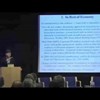parabol
Axiological Retributivism and the Desert Neutrality Paradox
Campbell, T. Axiological Retributivism and the Desert Neutrality Paradox. Philosophies 2022, 7, 80. https://doi.org/10.3390/philosophies7040080 Abstract: According to axiological retributivism, people canan outcome in which someone gets what she deserves, even if it is bad for her, can thereby haveintrinsic positive value. A question seldom asked is how axiological retributivism should deal withcomparisons of outcomes that differ with respect to the number and identities of deserving agents.Attempting to answer this question exposes a problem for axiological retributivism that parallels awell-known problem in population axiology introduced by John Broome. The problem for axiologicalretributivism is that it supports the existence of a range of negative wellbeing levels such that if adeserving person comes into existence at any of these levels, the resulting outcome is neither betternor worse with respect to desert. However, the existence of such a range is inconsistent with a setof very plausible axiological claims. I call this the desert neutrality paradox. After introducing theparadox, I consider several possible responses to it. I suggest that one reasonable response, thoughperhaps not the only one, is to reject axiological retributivism.
Katie Steele: The real paradox of supererogation
Katie Steele, Associate Professor, Australian National University. Abstract It is a feature of our ordinary moral talk that some acts are supererogatory, or beyond what is required. But ‘beyond’ in what
A Paradox for the Intrinsic Value of Freedom of Choice
in Noûs, Volume 34:4 AbstractA standard liberal claim is that freedom of choice is not only instrumentally valuable but also intrinsically valuable, that is, valuable for its own sake. I argue that eac
The refinement paradox and cumulative cultural evolution: Complex products of collective improvement favor conformist outcomes, blind copying, and hyper-credulity
PLOS Computational Biology Abstract Social learning is common in nature, yet cumulative culture (where knowledge and technology increase in complexity and diversity over time) appears restricted to huma
How much scope for a mobility paradox? The relationship between social and income mobility in Sweden
Sociological Science 3:39-60. 10.15195/v3.a3. Abstract It is often pointed out that conclusions about intergenerational (parent–child) mobility can differ depending on whether we base them on studies of c
The Demos and Its Critics
The Review of Politics, 81(3), 435-457. doi:10.1017/S0034670519000214 Abstract The “demos paradox” is the idea that the composition of a demos could never secure democratic legitimacy because the composi

The future of work with Richard Freeman
Last October, Harvard professor of economics, Richard B Freeman gave a lecture on the future of work and the paradox of increased inequality despite higher levels of productivity and teamwork. The lec
Malcolm Fairbrother: Trust and Public Support for Environmental Protection
Dr Malcolm Fairbrother, University of Bristol ABSTRACTMost people say they are concerned about the serious environmental problems confronting the world today and threatening the well-being of future ge
Parfit and the economists: A contribution to the debate on the optimal population size
Revue de Métaphysique et de Morale, 102, 23-37 Abstract This paper presents Derek Parfit’s contribution to the debate on the optimal population size, as it has been developed by economists. Parfit’s des
Documentation - länkar till aktiviteter
Here you will find documentation from public seminars in English. October 31st 2013: Is the world ready for democracy? New results from the World Values Survey. Film from the seminar October 14th 2013: Th Researcher Richard B. Freeman talks about the paradox of increased team production and the greater inequality in pay in the knowledge economy.








